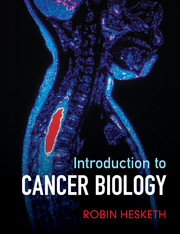Book contents
- Frontmatter
- Contents
- Acknowledgements
- Foreword
- Introduction
- 1 Lessons from epidemiology
- 2 Causes of cancer
- 3 Signalling in normal cells
- 4 ‘Cancer genes’: mutations and cancer development
- 5 What is a tumour?
- 6 Cancer signalling networks
- 7 The future of cancer prevention, diagnosis and treatment
- 8 The future of cancer in the post-genomic era
- Appendix A Tumour grading and staging
- Appendix B Targets of specific anti-cancer drugs
- Appendix C Classes of major oncoproteins
- Appendix D Major tumour suppressor genes
- Appendix E Ten major cancers at a glance
- Glossary and abbreviations
- Bibliography
- Index
- Plate Section
1 - Lessons from epidemiology
Published online by Cambridge University Press: 05 February 2013
- Frontmatter
- Contents
- Acknowledgements
- Foreword
- Introduction
- 1 Lessons from epidemiology
- 2 Causes of cancer
- 3 Signalling in normal cells
- 4 ‘Cancer genes’: mutations and cancer development
- 5 What is a tumour?
- 6 Cancer signalling networks
- 7 The future of cancer prevention, diagnosis and treatment
- 8 The future of cancer in the post-genomic era
- Appendix A Tumour grading and staging
- Appendix B Targets of specific anti-cancer drugs
- Appendix C Classes of major oncoproteins
- Appendix D Major tumour suppressor genes
- Appendix E Ten major cancers at a glance
- Glossary and abbreviations
- Bibliography
- Index
- Plate Section
Summary
We begin by looking at cancer patterns worldwide. These are of interest because they show marked variations in the forms of the disease that afflict different populations. These differences indicate the importance of environmental factors that include lifestyle – for example, what we eat and tobacco use – in determining both the type of cancer and the frequency of occurrence. Although there is variation in cancer types, there is a broad trend of rising incidence across the world, for which a major driving force is increasing longevity. In the developed world lung, breast, bowel and prostate cancers head the mortality table. Taking all cancers together, the last 30 years has seen a gradual increase in the five-year survival rate, although there remain significant variations between nations and even within some countries. For the developing world the outlook is more depressing: not only is the annual number of new cases rising but inadequate screening programmes often mean that diagnosis is delayed until tumours have spread to secondary sites in the body and therefore become very difficult to treat. Analysis of cancer mortality in different age groups revealed many years ago that the additive effects of about half a dozen discrete events drives cancer development – the first direct evidence that the accumulation of mutations is the underlying cause.
Incidence
Every year over 12 million people worldwide are diagnosed with cancer. Europe and North America together contribute about 40% of this figure with just over half of all new cases (54%) arising in developing countries. Of the various types of cancer that contribute to these figures, lung cancer heads the list with 1.4 million new cases annually (12.5%) followed by breast (1.2 million, 10.6%) and colorectal (1 million, 9.4%) cancers (Fig. 1.1). The names of these three cancers will be familiar to American and British readers because they are also in the top four of their national figures for both incidence and deaths due to cancers. The other member of the Big Four in those countries, and in most of the developed world, is prostate cancer (679,000, 6.3%). However, in the world rankings prostate is pushed down to sixth on the list by stomach and cervical cancer (934,000 and 692,000 cases annually, respectively).
- Type
- Chapter
- Information
- Introduction to Cancer Biology , pp. 1 - 19Publisher: Cambridge University PressPrint publication year: 2012



